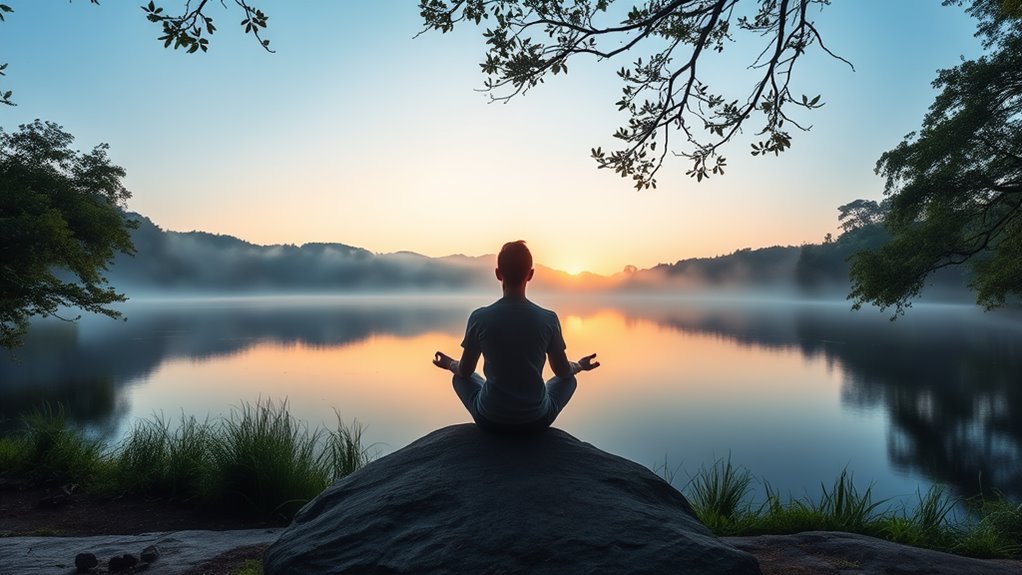How to Detox Your Mind and Achieve Inner Peace
To detox your mind and achieve inner peace, start by practicing mindfulness to clear stress and negativity. Engage in daily meditation, focusing on your breath and acknowledging thoughts without judgment. Implement a digital detox by setting limits on screen time and replacing distractions with enriching activities. Establish healthy boundaries, express yourself through creative outlets, and foster gratitude. These steps empower you to cultivate a balanced mind. Discover more strategies to enhance your mental clarity and well-being.
Key Takeaways
- Engage in mindfulness meditation to cultivate present-moment awareness and reduce stress, enhancing emotional resilience and overall well-being.
- Implement a digital detox by evaluating screen time habits and designating tech-free zones to promote mental clarity.
- Utilize journaling to externalize thoughts, identify patterns, and gain insights for better self-awareness and decision-making.
- Practice breathing techniques, such as diaphragmatic or box breathing, to relieve stress and promote relaxation.
- Establish healthy boundaries by recognizing personal limits and communicating them assertively to protect your mental space.
Understanding Mental Detoxification
When you think about detoxification, you might picture a physical cleanse, but mental detoxification is just as essential for your well-being. A mental detox involves clearing your mind of clutter, stress, and negative thought patterns that hinder your growth.
You need to recognize the sources of mental toxicity in your life, whether they’re toxic relationships, overwhelming responsibilities, or unproductive habits. By actively engaging in practices like journaling, meditation, or digital detoxes, you can regain mental clarity and focus. A comprehensive detox guide outlines strategies that can help you effectively navigate this process.
This process isn’t just about eliminating negativity; it’s about creating mental space for positivity and creativity to flourish. Embrace the journey of mental detox, and you’ll empower yourself to achieve greater mastery over your thoughts and emotions.
The Importance of Mindfulness
Mindfulness is a powerful tool for clearing your mind and enhancing your well-being.
By practicing mindfulness, you can experience various benefits, from reduced stress to improved focus.
Let’s explore techniques for mindfulness meditation and how to incorporate these practices into your daily life. Additionally, engaging in deep breathing techniques can significantly enhance your mindfulness practice, leading to even greater stress relief and clarity of thought.
Benefits of Mindfulness Practice
Although life can often feel overwhelming, practicing mindfulness offers a way to regain focus and clarity. By anchoring yourself in the present moment, you cultivate a heightened awareness that can drastically reduce stress and anxiety. This practice sharpens your ability to concentrate, enhancing productivity and decision-making skills.
Furthermore, mindfulness fosters emotional resilience, allowing you to respond to challenges with composure rather than reactivity. You’ll also experience improved relationships, as being fully present enhances your communication and empathy.
Regular mindfulness practice promotes overall well-being, leading to better sleep, increased energy, and a more balanced outlook on life. As you embrace mindfulness, you reveal a powerful tool for steering through life’s complexities with grace and intention. Additionally, incorporating breathing techniques into your mindfulness routine can further enhance your ability to manage emotions effectively.
Techniques for Mindfulness Meditation
Practicing mindfulness meditation can deepen your understanding and experience of being present.
Start by finding a quiet space where you won’t be disturbed. Sit comfortably, close your eyes, and focus on your breath. Notice the inhalation and exhalation, allowing thoughts to drift by without judgment. If your mind wanders, gently bring your focus back to your breath.
You can also explore body scans, where you mentally check in with each part of your body, releasing tension as you go. Additionally, try loving-kindness meditation by silently wishing well for yourself and others. Regular practice of breathing techniques can significantly enhance your meditation experience.
These techniques cultivate awareness and enhance your ability to navigate life’s challenges with clarity and calmness. Commit to a daily practice, and you’ll reveal deeper levels of mindfulness.
Incorporating Mindfulness Daily
Incorporating mindfulness into your daily routine can transform your perspective and enhance your overall well-being. Start by setting aside a few minutes each day to focus on your breath and sensations in the present moment. This practice sharpens your awareness, allowing you to respond to life’s challenges with clarity and intention.
Throughout your day, integrate mindfulness into everyday activities—whether it’s eating, walking, or even listening to others. By doing so, you’ll cultivate a deeper connection to your experiences and reduce stress.
Remember, consistency is key. Track your progress and be patient with yourself. As you master mindfulness, you’ll discover an inner peace that empowers you to navigate life’s complexities with grace and resilience. Additionally, incorporating specific breathing techniques can further enhance your mindfulness practice and help alleviate stress.
Embrace this journey; your mind deserves it.
Daily Meditation Practices
Many people find that daily meditation practices can noticeably enhance their mental clarity and emotional well-being. By dedicating just a few minutes each day to sit in stillness, you can cultivate a profound sense of awareness and focus.
Start by selecting a quiet space, closing your eyes, and concentrating on your breath. As thoughts arise, acknowledge them without judgment, then gently guide your attention back to your breath. Experiment with various techniques, like guided meditations or visualization, to discover what resonates with you.
Consistency is key; aim to meditate at the same time daily. Over time, you’ll notice greater resilience to stress and an enriched understanding of your thoughts and emotions, paving the way for deeper inner peace.
Creating a Digital Detox Plan
As you navigate the digital world, creating a digital detox plan can greatly improve your mental and emotional well-being.
Start by evaluating your current digital habits. Identify the platforms or devices that consume most of your time and attention.
Next, set specific goals: will you limit screen time, designate tech-free zones, or schedule regular breaks? Consider incorporating a gradual approach, reducing usage by a set percentage each week.
Communicate your intentions to friends and family for support.
Finally, replace digital distractions with enriching activities—read a book, practice mindfulness, or engage in physical exercise.
Nature and Its Calming Effects
Spending time in natural surroundings can greatly reduce stress and improve your mood.
When you take a mindful walk in nature, you’re not just enjoying the scenery; you’re also giving your mind a much-needed break.
Embracing the calming effects of nature can help you feel more grounded and present.
Benefits of Natural Surroundings
Natural surroundings offer a wealth of calming effects that can greatly enhance your mental well-being. When you immerse yourself in nature, you’re exposed to fresh air, vibrant colors, and soothing sounds, all of which can reduce stress and anxiety.
The simple act of being outdoors can lower cortisol levels, allowing your mind to declutter and refocus. You’ll find that natural light boosts your mood and energy, making it easier to tackle daily challenges.
Additionally, the beauty of your surroundings invites reflection and inspires creativity. By spending time in nature, you’re not just escaping the chaos of daily life; you’re actively nurturing your mental health.
Prioritizing these natural experiences can lead to profound clarity and a deeper sense of peace.
Mindfulness in Nature Walks
Walking in nature can amplify the calming effects already mentioned, especially when combined with mindfulness practices.
As you step onto the trail, take a moment to breathe deeply, letting the fresh air fill your lungs. Focus on the sensations beneath your feet—the crunch of leaves, the softness of grass. Notice the colors around you: the vibrant greens, the gentle browns, and the delicate blues of the sky.
Allow your mind to settle, focusing on the rhythm of your breath. When distractions arise, gently guide your thoughts back to the present moment.
This practice not only fosters tranquility but also enhances your connection to the natural world, grounding you in the here and now. Embrace this mindful walk as a path to inner peace.
Journaling for Mental Clarity
Journaling can be a powerful tool for achieving mental clarity, and just a few minutes each day can make a significant difference. By putting pen to paper, you externalize your thoughts, allowing you to confront and organize them effectively.
Start with a simple prompt: “What’s on my mind today?” Let your thoughts flow freely without judgment. This practice helps identify patterns, emotions, and obstacles that may cloud your mind.
As you write, you’ll gain insights that lead to better decision-making and enhanced self-awareness. Don’t worry about grammar or structure; focus on honesty and expression.
Over time, you’ll cultivate a clearer, more focused mindset, empowering you to navigate life’s challenges with confidence and clarity.
Breathing Techniques for Stress Relief
After clearing your mind through journaling, you might find that incorporating breathing techniques can further enhance your mental detox. Mastering these techniques can help you regain control over your stress levels and promote inner calm. Here’s a quick reference table for effective breathing methods:
| Technique | Description |
|---|---|
| Diaphragmatic Breathing | Inhale deeply through your nose, letting your abdomen rise, then exhale slowly. |
| Box Breathing | Inhale for 4 seconds, hold for 4, exhale for 4, and hold again for 4. |
| 4-7-8 Breathing | Inhale for 4 seconds, hold for 7, and exhale for 8. |
| Alternate Nostril | Close one nostril, inhale through the other, switch, and exhale. |
| Belly Breathing | Place hands on your belly, focus on expanding as you breathe in. |
Try practicing these techniques daily to cultivate a serene mind.
Establishing Healthy Boundaries
While it might feel uncomfortable at first, establishing healthy boundaries is vital for your mental detox and overall well-being. You need to recognize your limits and communicate them clearly.
Start by identifying situations that drain your energy or cause stress. Once you pinpoint these, practice saying no without guilt. Remember, it’s not selfish; it’s necessary for your mental health.
Be assertive yet respectful when discussing your boundaries with others. This helps create an environment where you feel safe and valued.
Monitor how others respond—genuine relationships will respect your limits. Finally, stay consistent. Re-evaluating your boundaries periodically guarantees they align with your evolving needs.
Prioritizing your well-being strengthens your mental resilience and fosters inner peace.
Engaging in Creative Activities
Engaging in creative activities can be a powerful way to detox your mind and rejuvenate your spirit. When you immerse yourself in artistic pursuits—be it painting, writing, or playing music—you access a flow state that frees your thoughts.
This process allows you to express emotions that may otherwise remain bottled up, fostering clarity and insight. As you create, you cultivate a sense of purpose that elevates your mental well-being.
Don’t shy away from experimentation; embracing the unconventional can lead to breakthroughs. Set aside time regularly to engage in these activities, and watch as your mind clears and your inner peace flourishes.
The Role of Physical Exercise
When you engage in physical exercise, you’re not just strengthening your body; you’re also enhancing your mental clarity.
Moving your body helps reduce stress levels, allowing your mind to focus better on what truly matters.
Boosts Mental Clarity
Physical exercise not only strengthens your body but also sharpens your mind, enhancing your mental clarity. When you engage in physical activity, you increase blood flow and oxygen to your brain, promoting cognitive function.
This boost helps you think more clearly, make decisions swiftly, and solve problems efficiently. Regular exercise can also improve your ability to focus, allowing you to cut through distractions and concentrate on what truly matters.
Whether it’s a brisk walk, a rigorous workout, or a calming yoga session, find what resonates with you. Commit to a routine, and watch as your mental sharpness flourishes.
With a clearer mind, you’ll reveal deeper insights and greater creativity, empowering you to master your thoughts and actions.
Reduces Stress Levels
While managing daily challenges, incorporating regular exercise into your routine can greatly reduce stress levels. Engaging in physical activity releases endorphins, your body’s natural mood lifters. Whether it’s a brisk walk, a challenging workout, or yoga, moving your body helps clear your mind and combats anxiety.
Here’s a quick overview of how different exercises can help:
| Exercise Type | Stress Reduction Benefit |
|---|---|
| Aerobic Exercise | Boosts endorphin levels |
| Strength Training | Increases self-confidence |
| Yoga | Promotes mindfulness and calm |
Building a Supportive Community
Creating a supportive community can greatly boost your mental well-being, as surrounding yourself with positive influences fosters resilience and growth.
Start by identifying individuals who inspire and uplift you. Seek out friendships that encourage open communication and shared values. Engage in activities that promote collaboration, whether it’s a book club, workout group, or volunteer organization.
Make it a priority to connect regularly, even if it’s through virtual meet-ups. Remember, it’s not just about receiving support; be proactive in offering your encouragement and insight to others.
This mutual exchange will deepen relationships and create a network of trust. As you nurture these connections, you’ll cultivate an environment that empowers both you and your community to thrive.
Cultivating Gratitude and Positivity
To cultivate gratitude and positivity in your life, start by intentionally recognizing the small joys around you. Each morning, take a moment to reflect on three things you appreciate—whether it’s a warm cup of coffee, a friendly smile, or a moment of quiet. This practice shifts your focus from what you lack to what you have.
Next, engage in daily affirmations that reinforce your strengths and aspirations. Speak kindly to yourself, acknowledging your progress and resilience.
Consider keeping a gratitude journal. Write down moments of gratitude each day, allowing your mind to retrain its narrative.
Surround yourself with positive influences; seek out uplifting content and inspiring people. By consistently embracing gratitude, you’ll naturally attract more positivity into your life.
Frequently Asked Questions
How Long Does It Take to Feel the Effects of Mental Detoxification?
When it comes to mental detoxification, you might feel the effects in a week or two. Just remember, slow and steady wins the race; patience is key as you cultivate lasting clarity and peace.
Can I Detox My Mind Without Meditation or Mindfulness Practices?
You can absolutely detox your mind without meditation or mindfulness. Engage in physical activities, pursue creative hobbies, or connect with nature. Each of these experiences clears mental clutter and fosters clarity, helping you feel rejuvenated.
What Are the Signs That I Need a Mental Detox?
You’ll notice signs like constant fatigue, irritability, difficulty concentrating, or feeling overwhelmed. If negative thoughts dominate your mind or you’re struggling to find joy, it’s time to contemplate a mental detox for clarity and rejuvenation.
Is There a Specific Diet That Supports Mental Detoxification?
You might be surprised to learn that a balanced diet rich in antioxidants, omega-3 fatty acids, and hydration can greatly enhance your mental clarity. Incorporate whole foods, leafy greens, and nuts for ideal mental detoxification.
How Can I Maintain My Mental Clarity After Detoxing?
To maintain mental clarity after detoxing, prioritize mindfulness practices, stay hydrated, and establish a balanced routine. Regularly engage in activities that stimulate your mind and body, ensuring you nurture your mental health consistently.





